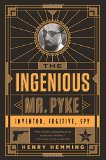Summary | Excerpt | Reviews | Beyond the Book | Readalikes | Genres & Themes | Author Bio

Inventor, Fugitive, Spy
by Henry Hemming
Perris urged Pyke as he left to take care of himself in Germany. If he felt someone was onto him, or had even the slightest suspicion that he was being watched, he must leave immediately. Pyke stepped out of the offices of the Chronicle feeling punch-drunk and on his way down Fleet Street began to sweat.
Over the next twelve days he prepared for his journey with the urgency of a man fighting for air. He read up on Germany, Germans and German frontiers. He spent the night in a print shop on Fleet Street. He went to Tilbury with a Chronicle employee to meet a sailor. He found the names of men who had managed to get out of Germany and travelled the length of the country to pick their brains: 'some knew a little, most knew nothing, one knew a lot.'
On 12 September, a forgettable and blowy day in London, Pyke said goodbye to his mother, his brother and two sisters, telling them that he had been taken on as a Chronicle Special Correspondent and was off to Stockholm. This was true. Perris had accepted him as a Special Correspondent, and, yes, he planned to go to Stockholm. Only it was not the whole truth.
As Pyke waited on the platform at King's Cross for the train to Newcastle, where he would take a boat to Norway, his mind turned again to the mission ahead. If caught, the best he could hope for was to be sent back to England with the German equivalent of a clip round the ear. More likely, he would spend the remainder of the war in prison. Confident that hostilities would be over by Christmas, this did not trouble him – and besides, several months in a German jail might make for an interesting set of articles.
There was another possible ending to this adventure which until then he had contrived to ignore. Pyke knew that what he hoped to do might be construed as espionage. While he had not heard of Englishmen being executed for spying, the war was barely a month old and there was no reason why they might not start with him. Indeed, he might not live to see his twenty-first birthday – the thought of which, he wrote, was 'like a hot iron searing my soul'.
Less than two weeks later Geoffrey Pyke settled down to a cold beer in a café deep inside the German empire. By then the British intelligence agency later known as MI6, or SIS, was unable to get even one of its agents into the country. This untrained twenty-year-old, incapable of speaking fluent German and thought to be 'unbalanced', had somehow succeeded where MI6 had either failed or had not dared to take the risk. It was a breathtaking achievement, not least because it had been done entirely on his own initiative. Pyke had defied the received wisdom of the day, according to which Germany was an impenetrable fortress. In doing so he had set himself up for the great journalistic scoop of the war. What baffled everyone who heard about this – as many soon would – was how on earth he had managed to get himself into Germany in the first place.
Excerpted from The Ingenious Mr. Pyke: Inventor, Fugitive, Spy by Henry Hemming. Copyright © 2015 by Henry Hemming. Reprinted with permission from PublicAffairs.
I find that a great part of the information I have was acquired by looking something up and finding something else ...
Click Here to find out who said this, as well as discovering other famous literary quotes!
Your guide toexceptional books
BookBrowse seeks out and recommends the best in contemporary fiction and nonfiction—books that not only engage and entertain but also deepen our understanding of ourselves and the world around us.